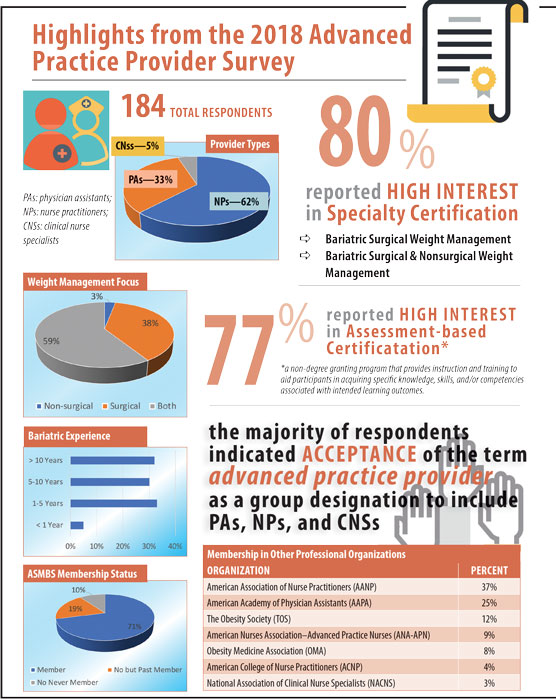The ASMBS Continuing Evaluation into Bariatric Specific Credentialing/Certification for PAs, NPs, and CNSs
 by William Gourash, PhD, CRNP, and Karen Flanders, MSN, CNP, CBN
by William Gourash, PhD, CRNP, and Karen Flanders, MSN, CNP, CBN
Dr. Gourash is with Magee Womens Hospital of the University of Pittsburgh Medical Center in Pittsburgh, Pennsylvania. Ms. Flanders is with Massachusetts General Hospital Weight Center in Boston, Massachusetts.
Funding: No funding was provided.
Disclosures: The authors report no conflicts of interest relevant to the content of this article.
Bariatric Times. 2019;16(4):24–25.
This ongoing column seeks improve communication, exchange of ideas, and integration of standardized patient care among all members of the allied healthcare team in bariatric and metabolic medicine
Several years ago, the American Society for Metabolic and Bariatric Surgery (ASMBS) formed a task force that comprised physician assistants (PAs), nurse practitioners (NPs), and clinical nurse specialists (CNSs)—collectively referred to as advanced practice providers (APPs)—and metabolic and bariatric surgeons. The Advanced Practice Provider Task Force (APPTF) was commissioned with exploring options for professional specialty credentialing/certification for the APP in the field of metabolic and bariatric surgery.
The current APPTF members include Karen Flanders, MSN, CNP, CBN; William Gourash, CRNP; Christa Black, PA-C; Tammy Dodds, PA-C; Michael Dougherty, PA-C; Karen Schulz, MSN, CNS; Marina Kurian, MD; Wayne English, MD; Jessie Moore, FNP-BC; Brett Gordon, PA-C; and Susan Haury (ASMBS liaison).
In 2015, the task force began exploring the interest and feasibility of pursuing and maintaining a bariatric credential within these disciplines through a survey of APPs working in the specialty of metabolic and bariatric surgery. The survey was developed by the APPTF and sent to 634 active APP email addresses. There was a return of 124 (19.6%): 53 percent NPs, 43 percent PAs, and four percent CNSs. The vast majority of the respondents were in clinical practice, and approximately half were involved in both surgical and nonsurgical care of the bariatric patient. Results of the survey indicated interest in the following: obtaining a bariatric surgical certification (77%), including bariatric surgical and nonsurgical content (83%), and combining PAs, NPs, and CNSs (those who have been trained and in their states are licensed to diagnose and treat like NPs and PAs) in one certification [87%]). A complete report of the results were published in December 2016 in Bariatric Times.1 The results also indicated strong interest among PAs, NPs, and CNSs to develop a metabolic and bariatric surgery credential. However, further steps would be required to identify and communicate with a larger number of APPs, solidify and enhance an “esprit de corps” among APPs practicing in metabolic and bariatric surgery, and explore additional credentialing options. These steps would lead us to a second survey to further investigate aspects of credentialing feasibility.
As of 2018, there were 147 PA and 210 NP and CNS members (predominantly NPs) of the ASMBS. Together, they make up about 22 percent of the integrated health (IH) membership. The APPTF reached out and will continue to explore collaborations with several other related professional organizations, such as the American Academy of Physician Assistants (AAPA), American Association of Nurse Practitioners (AANP), and the Obesity Medicine Association (OMA).
The APPTF established the First Annual PA, NP, and CNS Symposium at ObesityWeek in 2016 The goal of the symposium was to provide APPs with an opportunity to network with other types of professionals involved in bariatric and metabolic medicine. The meeting has continued to grow in popularity over the years, and is now recognized by the APP community as an excellent opportunity for professional growth. We are currently planning the Fourth Annual PA, NP, and CNS Symposium, which will be held during ObesityWeek 2019, November 3 to 7, 2019, in Las Vegas, Nevada.
In addition to a certification credentialing option, the APPTF has explored other educational opportunities for its members. The development of an assessment-based certificate (ABC) program for the group has shown particular promise. An ABC program is a nondegree-granting program that provides instruction and training to participants who wish to gain knowledge, skills, and/or competencies associated with a specific learning objective. An ABC program provides instruction and evaluates the progress and achievements of its participants with respect to its particular learning objective. Participants must pass an examination, prior to completion, to ensure the learning objective is achieved. Certificates of completion are awarded to those participants who meet the performance, proficiency, or passing standard set forth by the particular ABC program. The purpose is to build competency and recognition of a specialty area of practice or set of skills. Participants do not receive a professional designation as they do with a credentialing program. This could be an end goal or a stepping stone to professional certification. This led the APPTF to commission a second feasibility survey to further assess the needs and preferences of its members, results of which are presented here.
Survey Aim
We aimed to further explore the feasibility of establishing and maintaining a bariatric surgical credentialing option (certification or assessment-based certificate) for PAs, NPs, and CNSs working in the specialty of bariatric surgery.
Methods
An internet survey was developed by the APPTF with input from all APP provider types and the ASMBS Certified Bariatric Nurse Certification Committee. It was based on the 2015 survey and comprised 24 questions. The survey was distributed to APPs in August and September 2018. A request for completion and a survey link was sent by email to PAs, NPs, and CNSs in the ASMBS database. The email with survey link was delivered to 870 viable email addresses four times over the two-month interval. Additionally, a request and link were published in Bariatric Times.
Results
In total, 184 (21.1%) respondents completed the survey; 62 percent NPs, 33 percent PAs, and five percent CNSs. The majority of respondents were current ASMSBS members (71%) while 19 percent were past members and 10 percent were never members of the ASMBS. Thirty-two percent had more than 10 years of experience working in the bariatric field, and 30, 33, and five percent reported being in the field 6 to10 years, 1 to 5 years, or less than one year experience, respecitvely.
Survey respondents also indicated if they were current members of other professional organizations. The majority answered that they were members of the American Association of Nurse Practitioners (AANP) followed by the American Academy of Physician Assistants (AAPA) and The Obesity Society (TOS).
Fifty-nine percent of respondents answered that their practice focused on both surgical and nonsurgical weight management. Postoperative and perioperative care were among the top job responsibilities reported by respondents, followed by inpatient care and assisting in the operating room.
When asked to rate their interest in obtaining a specialty certification in bariatric surgical and medical (nonsurgical) weight management for PAs, NPs and CNSs, 80 percent selected “Strongly Agree” or “Agree.” If a certification program was not feasible, they were asked to rate their interest in obtaining participating in an ABC program in bariatric surgical and medical (nonsurgical) weight management for PAs, NPs, and CNSs: 77 percent selected “Strongly Agree” or “Agree.” Sixty-one percent of respondents were interested in actively assisting in the credential development process.
When asked to rate their acceptability of the term “Advanced Practice Provider (APP)” as a group designation for PAs, NPs, and CNSs, 42 percent selected “Extremely Acceptable,” 44 percent selected “Very Acceptable,” 12 percent selected “Somewhat Acceptable,” one percent selected “Not so Acceptable,” and the remaining one percent indicated “Not at all Acceptable.”
Discussion
The findings of this survey indicate that the majority of responding APPs are interested in a credentialing option in the specialty area of metabolic and bariatric surgery. The responding APPS indicated they have a wide range of bariatric experience; more than half practice in nonsurgical and surgical weight management, and most of the respondents indicated that their job responsibilities include preoperative and postoperative aspects of bariatric care. More than half indicated they have inpatient responsibilities and assist in the OR. A strong majority expressed their interest in obtaining specialty certification for bariatric surgical weight management that would include surgical and nonsurgical weight management content. Additionally, the majority indicated they support integrating PAs, NPs, and CNSs into one group. Additionally, in lieu of a credentialing program, a strong majority expressed interest in obtaining an ABC. Sixty percent of the respondents indicated they are willing to actively support the development of a credentialing program. Finally, respondents indicated that use of the term advanced practice provider to identify this group of PAs, NPs, and CNSs is acceptable.

Conclusion
The support for the Annual PA, NP, and CNS Symposium at ObesityWeek and results of the two surveys conducted by the APPTF indicate there would be adequate support to continue efforts toward the development of a credentialing option for PAs, NPs, and CNSs in the specialty area of bariatric and metabolic surgical weight management. The APPTS will further explore the logistical feasibility of the certification program option and will continue to explore collaborations with other organizations who have interests in APPs and credentialing (e.g., OMA, TOS, American Association of Nurse Practitioners [AANP], American Academy of Physician Assistants [AAPA], and the American Board of Medicine [ABOM]). Additionally, due to the significant cost and time associated with developing a certification program (i.e., 2 to 4 years), the credentialing option of an ABC program will continue to be aggressively explored either as an end option or as a stepping stone to the development of a certification program.
Post-survey Steps
The feasibility and exploration of the metabolic and bariatric surgery certification for PAs, NPs, and CNSs calls for the need for further exploration before any definite decision can be made. Areas that require further delineation, many of which are already in the works, include the following: 1) continued regular meetings of the APPTF, 2) further dissemination and publication of these survey results, 3) further delineation of the logistics of certification program development (e.g., process, timeline, cost projection) and investigation of options and criteria for accreditation of the potential certification program, 4) further investigation of the process of development of an ABC program (e.g., process, timeline, cost projection) and the criteria for accreditation, and 5) continued active exploration of potential collaborative efforts with other organizations who have interest in APP credentialing in bariatric and metabolic weight management (e.g., OMA, TOS, AANP, AAPA, ABOM). The APPTF will continue to work through these steps, and we thank all APPs who participated in the survey.
References
- Flanders K, Gourash W. The ASMBS preliminary evaluation into bariatric specific credentialing/certification for PAs, NPs, and CNSs. Bariatric Times. 2016;13(12):16–17.
Category: Hot Topics in Integrated Health, Past Articles



